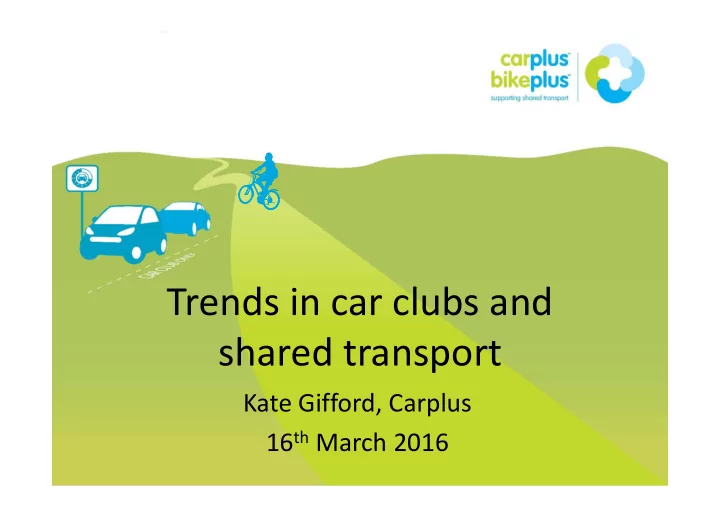

Trends in car clubs and shared transport Kate Gifford, Carplus 16 th March 2016
Contents 1. Scale of the car club sector in 2016 UK – Europe – Growth projections – 2. Who uses car clubs and why? A review of the evidence – 3. Sector developments Uber and the disruptors – Sharing Economy review – 4. EVs in UK car clubs 5. Questions
1. Scale of the car club sector in 2016
UK car club sector in 2016 • Two main operational models – One way (flexible and fixed) – Back to base • Key operators in UK – Zipcar – City Car Club/Enterprise – E ‐ car club – GoDrive (London) – DriveNow (London) – Co ‐ wheels – Hertz 24/7 – Number of smaller operators
Future growth • Expansion of flexible operators – BlueCity launch in London (Autumn 2016?) – Car2Go to return to market? – Expansion to other cities outside of London • Other operators exploring one way offer • Growth of EVs – determined by provision of operational charge point network • Go Ultra Low – funding for expanded EV charging network • Autonomous vehicles?
Car club sector in Europe (1) • Autolib’ in Paris – More than 100,000 members – 16,000 rentals per day – 3,500 vehicles • Impacts – 120 million zero emission kilometres travelled since Dec 2011 – ~25% of subscribers have sold a vehicle – Reduction of 11% in private car journeys
Car club sector in Europe (2) DriveNow • – Munich, Berlin, Hamburg, Copenhagen, Stockholm etc. and USA Car2Go • – Austria, Germany, Italy, Netherlands, Sweden, Spain and USA Ford GoDrive • – Operating trials in London, Germany, India and USA Zipcar • – Spain, France, Austria, USA Other local operators and • manufacturers
Growth projections • London: – 171,000 members; 2480 vehicles • LCCS growth projection: – 1 million members by 2025 • England and Wales growth projections: – 0.75 million members by 2025 (without policy and funding) – 3.3 million members (with supportive policy and funding)
2. Who uses car clubs?
Demographic profile of members • Graduates living in regenerated inner city locations (19%) • Older singles living in leafy inner suburbs (14%) • Wealthy households in accessible city suburbs (11%) • Other Mosaic types, including – Student dominated areas near universities (10%) – Ambitious city dwellers in their 20s and 30s (9%)
Why do they use car clubs?
Journey purpose • Not generally used for commuting • Visiting friends and family, shopping, leisure • More trip chaining • Sharing journeys – Higher car occupancy than average
3. Sector developments
Sector developments 1. UberPOOL Launched in London Dec 2015 – Operating in San Francisco and – London Mixed reviews from London – Competitor to 2+ car sharing? – 2. Lyft Line ‐ Available in Los Angeles, San Francisco ‐ Generally cheaper than UberPool and allows more passengers per journey. Key questions remain about impacts • of on ‐ demand taxis
Taxis / Uber in London • TfL currently undertaking a regulations review of private hire industry (incl. Uber) • Supply and demand study to understand size of market and how this has changed. • Also considering whether minicabs should continue to be exempt from Congestion Charge • Other cities are looking at ways to regulate new technologies
Sharing Economy review
4. EVs in car clubs
EVs and hybrids
EVs and hybrids • Nearly 1,000 individuals in Scotland have been introduced to the EV experience through their local car club • 68% of survey respondents had tried a car club EV • 87% of survey respondents had a positive experience using a car club EV
Hydrogen vehicles
Future of EVs in car clubs • Go Ultra Low cities – London, Milton Keynes, Nottingham, Bristol • Source London? • Key challenges – Establishing a reliable charging infrastructure – Purchase / resale price of EVs – User familiarity – Charging/booking models • Further subsidies required?
Kate Gifford Kate@carplus.org.uk www.carplus.org.uk 0113 4105 263 Follow us on Twitter @CarplusTrust
Recommend
More recommend